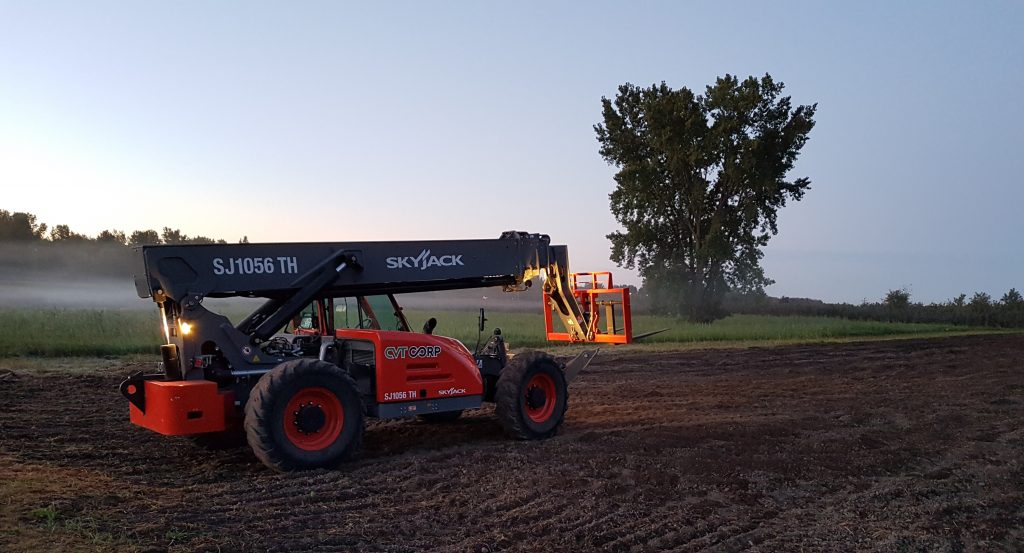CVTCORP in Diesel Progress Magazine!

Diesel Progress Article – July 2017
TOUTING TOROIDAL TRANSMISSION TECHNOLOGY
CVTCorp reaches expanding range of markets with its continuously variable transmission
BY CHAD ELMORE- DIESEL PROGRESS — When talking with potential customers, CVTCorp can highlight the fuel economy gains and operational ease that its mechanical continuously variable transmission (mCVT) can make possible in mobile off-highway equipment. But while it’s true that every end user and equipment owner will benefit from those attributes, the company has found some aspects resonate more deeply with certain customers than others. “Rental agencies don’t really put as much emphasis on fuel economy,” said Jeremy Shiflett, vice president of Sales, Marketing and Service for CVTCorp, Sainte Julie, Quebec, Canada. “They’re not paying for fuel. “But because we can keep their equipment running and more productive so they don’t spend all their time making repairs and can rent it out more often, that’s big to them. Also, because of the increase in efficiency of the system, they’re able to avoid the higher-horsepower machine and go with 74 hp solutions, which means less cost due to the extra emissions equipment required.”
CVTCorp is currently working with Skyjack to install its EcoMec 150 mechanical CVT transmission with a lateral offset in the manufacturer’s TH series of telehandlers. It is the ideal application, said CVTCorp, to show how its transmission can reduce equipment abuse from operators. The transmission ramps up and down for acceleration and deceleration with no shock loads from abrupt gear changes — even into reverse — and no hunting between ranges, the company said, plus at speeds as slow as 0.5 mph the telehandler has full power. The transmission will also permit Skyjack engineers to get more work out of Tier 4 final 74 hp diesel engines, “allowing rental companies to reduce net costs to their customers,” Skyjack said when the partnership was announced last year. To be offered as optional equipment, the CVT fits the same envelope as the telehandler’s existing powershift transmission.
Founded in 2001 to develop patented toroidal CVT technology, CVTCorp has logged more than a half-million hours of testing since then. The system is designed to transmit torque between curved traction discs using actuated rollers, allowing output speed to be varied across an infinite number of ratios. Traction fluid, which becomes near solid under pressure, eliminates metal on metal contact. Without oil the CVT would not able to repeatedly transfer power without damage as there are no teeth — it is a 100% friction drive. In the simplest terms, the company’s transmission is an oversized bearing built from 35 parts.
CVTCorp currently develops and manufactures CVTs for the construction, agricultural and power generation markets and has an eye on marine applications. The transmissions are based on its D10 toroidal cartridge that is designed to handle 74 to 140 hp engines. Any minor differences within the D10 are based on load patterns in the application. “Because there’s a common base component in our current applications there’s a volume benefit,” Shiflett said. “And because the design is scalable, we’re in discussions with customers that need smaller CVTs as well as larger units for 400 hp. Those are long-term goals.”
In addition to its work with Skyjack, CVTCorp is developing an implement drive for a North American vertical feed mixer manufacturer. The implement drive — with its integrated wet clutch, electronic control unit (ECU) and toroidal CVT technology — will allow end users to optimize the mixing process for livestock feed, the company said. The CVT-based implement drive provides the opportunity to operate the feed mixer system with a smaller tractor, the company said, making it possible to mix when driving while not overpowering the tractor engine. “Traditional gearboxes currently offered in the feeder mixer market have fixed ratios of one, two or three speeds that limit the mixing optimization under different operating conditions,” Shiflett said. “Our technical team has developed a highly efficient implement drive that is a gamechanger for the market. “But our vision for this product is much bigger as we see a product that will be applied on several implements such as tillers, tub grinders and sprayers.”
CVTCorp CEO Dan Girard founded the company while he was at work on an engineering degree at ETS (École de Technologie Supérieure, or Superior Technology School) in Montreal, Quebec, Canada. Two engineers focused on the toroidal design while Girard was in class. By 2005 the company had the money to move into a 7000 sq.ft. factory and invest in CNC equipment and a diesel-powered test cell. In the early days, its goal was to develop a CVT for power generation applications and by 2009 it was working on a transmission with a major farm tractor manufacturer. When the project was cancelled in 2014 due to the downturn in the ag market, Girard and the rest of the team took a close look at their next steps. Potential applications for the CVT range from mall escalators to mine haul trucks, but as a small, privately funded company they needed a focus. They identified the construction equipment market. “People might look at us from outside and see our work with feed mixers, construction equipment and tractors and say, ‘Those guys are nuts,’” Girard said. “Well, we’re not nuts. We were focusing on ag and were ready to go before the market collapsed. “When that happened, we looked at construction. There are a lot of small- to medium-sized players in construction that need a market differentiator that the mCVT can provide. We are still active in ag, as well, but now we’re working with many more companies that have something to gain by using new technology. “We’re now at a point with our mechanical CVTs that no competitors have reached. We know we have to walk before we run, but we are going to run fast. The potential for CVTs is huge.”
Today, the company’s headquarters east of Montreal is a 35,000 sq.ft. facility with three test cells and seven bays. Its 42 employees are nearly all engineers. As it ramps up to production it has also begun to hire people with manufacturing and quality know-how. There are plans to add personnel to the marketing department, as well. “Our headquarters is an R&D shop with production capabilities in very low volume,” Shiflett said. “We can do quality checks, prototypes and modifications. There is also a strong supply base in Montreal to do a lot of our components in small volumes.”
To support mass production, CVTCorp recently expanded its relationship with Jinmyung Frictech Co. Ltd. (JMFT), a manufacturer of brake and transmission components and one of its longtime suppliers. JMFT’s new $20 million factory in South Korea will be vertically integrated with the onsite manufacture of gears, shafts, clutches and assemblies for the CVT cartridge and eventually complete transmissions. “We’re very pleased to take our mCVT technology to market and expand our existing relationship with JMFT, a wellrespected supplier in the agricultural and construction equipment markets,” Girard said. “This investment is the result of strong global demand for the mCVT product and it will enable us to support the business growth for years to come and provide support to our international OEM customers.” JMFT is also part of a joint venture with NTCI Engineering Services Pvt. Ltd. – India. The company, JM Frictech India Pvt. Ltd. (JMI), is a wet brake and clutch specialist. Through JMI, CVTCorp has access to a sourcing agent for additional parts.
Those relationships are also expected to help CVTCorp sell into the international markets. “India has an initiative to get to where the United States and Europe are on emissions standards,” Shiflett said. “To do that they can’t stay with manual transmissions. Do they go to a powershift technology that has been around, or do they hurdle that and go to a new technology that is going to offer a lot more advantages? That’s what we’re selling. They can optimize the engine and bridge the gap and go into new markets. Our CVT will work with electronic and mechanical engines, which are still common in Asia.”
The Canadian company has set up distribution agreements with Great Lakes Power Service Co., of Mentor, Ohio, to cover the continental United States. It will support all service and warranty activities and will also work to distribute products in key market areas. It has 14 locations throughout the Midwest and eastern U.S. In Canada, it will be represented by The Gear Centre Group, based in Edmonton, Alberta.
“Engine technology has advanced so much in the last 10 years with electronic engine control and emissions, and in automotive they’ve been forced to use transmissions that cater to that,” Shiflett said. “They’re looking at nine- and 10-speed transmissions, chain or belt CVTs and some at toroidal technology. It’s coming. “We can do the same with the off-highway market. We have a cost-effective product that can compete with powershift and have performance advantages. We can help people use engines under 74 hp for the simplicity, but also 107 and 140 hp engines to get more power to ground. Engineers can downsize engines and optimize performance.” While the focus all along has been toroidal perfection, the company’s engineers have also amassed expertise in other areas, such electronics and hydraulics, which it said it can leverage when working with customers that do not have those skill sets in-house. “We are strong in manifold design and have a strong clutch side with JMFT,” Shiflett said. “We have already been approached by a few people to build circuits for auxiliary manifolds.” The company also developed a telematics system it uses during testing. “We can bring that expertise to the table, as well, and add it on for small to medium-sized OEMs that don’t have capital to invest in such a system on their own,” Shiflett said. “We can bring that technology with the transmissions.”
Along with expanding the size range, CVTCorp is also working on a transmission with a vertical drop configuration to compete with the more standard configuration of powershift transmissions used in the market and the company also sees an opportunity to target some typical hydrostatic transmission applications.
“Where will we be in five years? It’s difficult to say,” Girard said. “We need to keep proving the product, build the credibility. But our investor and I are not worried at all about our next steps. “We know our limitations and in certain areas it is better to have partnerships, such as with the JMFT deal. We are open to taking different avenues in different markets. If a company is already making a transmission, we can sell them a toroidal. The toroidal and the controller is our IP, and we’re not going to teach guys how to make gears. We have more than one way to reach the market. “Our vision is to be the best solution provider for mechanical CVTs and have the best CVT transmission on the market with the most flexibility and expansion capability.” – dp




